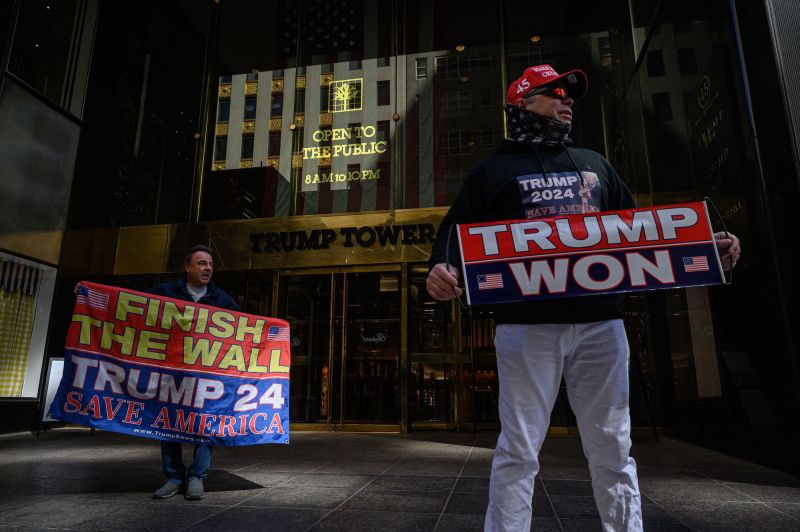Who Are They And Why Do They Matter?

In the ever-evolving landscape of American politics, the phenomenon of unexpected Trump supporters has captured the attention of analysts, journalists, and everyday citizens alike. The 2016 election marked a significant shift in political alliances and loyalties, with individuals from various backgrounds and walks of life voicing their support for Donald Trump. These supporters often defy preconceived notions about political affiliations, challenging the traditional narratives surrounding party lines.
As we delve deeper into the motivations and identities of these unexpected Trump supporters, it becomes clear that their stories are as diverse as the American populace itself. From veterans to artists, and from suburban mothers to urban professionals, the coalition of Trump supporters spans a wide range of demographics. Understanding who these individuals are and what drives their support is essential to grasp the complexities of contemporary American politics.
Through this exploration, we aim to uncover the layers behind this unexpected support, examining the social, economic, and cultural factors that play a role in shaping political beliefs. Join us as we embark on a journey to better understand the unexpected Trump supporters and their impact on the political landscape.
Who Are the Unexpected Trump Supporters?
The term "unexpected Trump supporters" refers to individuals who may not fit the typical mold of a Trump voter. These supporters often belong to demographics that traditionally align with the Democratic Party or have been historically marginalized within the political spectrum. Understanding who these supporters are can provide valuable insights into the shifting political landscape.
What Are the Demographics of Unexpected Trump Supporters?
Unexpected Trump supporters come from various backgrounds, which can include:
- Minorities and people of color
- Young millennials and Gen Z voters
- Working-class individuals
- Women in suburban areas
These demographics highlight that Trump’s appeal transcends traditional party lines, reflecting a broader discontent with the status quo and a desire for change.
How Do Economic Factors Influence Unexpected Trump Supporters?
Many unexpected Trump supporters cite economic frustration as a primary motivator for their support. Factors include:
- Job loss and economic instability
- Frustration with globalization and outsourcing
- Desire for better trade policies
These economic concerns resonate deeply with individuals who feel left behind by traditional political elites, prompting them to rally behind Trump's message of economic nationalism.
What Role Does Identity Play for Unexpected Trump Supporters?
Identity politics has become a central theme in modern political discourse. For unexpected Trump supporters, identity often intersects with their political beliefs in unique ways. Many supporters grapple with their identities as they navigate the polarized political climate, leading to surprising alliances and connections.
Can Unexpected Trump Supporters Influence Future Elections?
The presence of unexpected Trump supporters poses critical questions for future elections. Their shifting allegiances can disrupt traditional voting patterns, making them a valuable demographic for political strategists. Understanding their motivations could be key to securing votes in upcoming elections.
How Do Cultural Factors Affect Unexpected Trump Supporters?
Cultural factors also play a significant role in shaping the beliefs of unexpected Trump supporters. Elements such as:
- Media consumption habits
- Community values and norms
- Social networks and peer influences
These factors can create a conducive environment for Trump’s messaging, allowing individuals to feel a sense of belonging and validation in their political choices.
What Are Some Notable Examples of Unexpected Trump Supporters?
Several prominent figures have emerged as unexpected Trump supporters, breaking the mold of traditional political affiliations. Some notable examples include:
- 50 Cent (Curtis Jackson) - The rapper surprised many by voicing support for Trump based on economic policies.
- Kid Rock - The musician has been an outspoken supporter of Trump, emphasizing a shared background and values.
- Roseanne Barr - The comedian’s support for Trump highlighted the appeal of his outsider status among Hollywood figures.
These individuals exemplify the diverse nature of unexpected Trump supporters and the reasons behind their political choices.
Conclusion: What Does the Future Hold for Unexpected Trump Supporters?
The phenomenon of unexpected Trump supporters illustrates the complexities of American political identity. As the political landscape continues to evolve, understanding these supporters will be crucial for both political parties. Their stories provide a window into the changing dynamics of voter loyalty and the factors driving political engagement in an increasingly divided nation.
In summary, unexpected Trump supporters challenge our understanding of political affiliation, reminding us that the motivations behind support can be multifaceted. As we move forward, keeping an open mind and engaging with diverse perspectives will be essential to foster a more inclusive political dialogue.
ncG1vNJzZmivp6x7o77EnKKepJxjwqx7xJyfqJyRnrm6fZJorKedqKWypMDEnWStqqWivW6%2F1KmnqKqkmr%2B0esetpKU%3D
